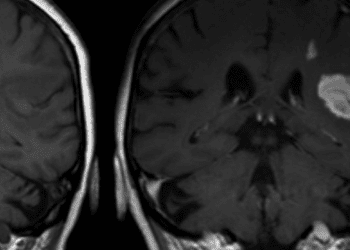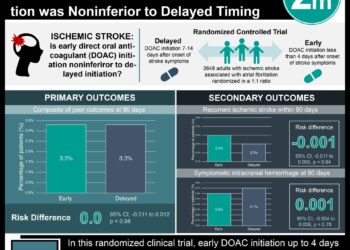Arterial embolization successfully treats bleeding in anticoagulated patients
1. Anticoagulated patients with soft tissue bleeding can successfully be treated with arterial embolization with a high degree of technical and clinical success. This is linked to reduced transfusion volume requirements.
2. Multiple detector computed tomography angiography is a sensitive technique for detecting soft tissue bleeding in suspected patients and selecting candidates for endovascular therapy.
Evidence Rating: 4 (Below Average)
Study Rundown: Anticoagulated patients are at higher risk for soft tissue hemorrhage, a potentially fatal and difficult to manage complication of such therapies. A lack of clear roles for medical management, surgery or endovascular directed therapies makes treatment controversial, and little data regarding best practices in anticoagulation-related bleeding exists. This retrospective case-series of anticoagulated patients who developed soft-tissue bleeding examined those who had undergone multiple detector computed tomography angiography (MDCTA) with subsequent endovascular embolization. The purpose of the study was to determine if arterial embolization of bleeding parent vessels may successfully and safely manage hemorrhage and to broadly examine the role of MDCTA in selecting such patients for endovascular treatment. Arterial embolization was technically successful in all of the 36 identified patients, and catheter angiography identified active bleeding in 75% of patients. Thirty patients were able to undergo MDCTA, which showed an overall sensitivity of 87% in detection of an active bleed. This study suggests that arterial embolization of patients is a feasible strategy for anticoagulated patients who develop soft-tissue bleeding. It also identifies MDCTA as a sensitive technique for detecting bleeding in suspected patients. This study was limited by its case-series nature, which lacked controls, and was further hindered by a relatively small sample size. Future studies would benefit from a larger, prospective controlled evaluation of patients undergoing arterial embolization, with a shorter time frame between MDCTA and intervention.
Click to read the study in American Journal of Roentgenology
Relevant reading: Relative Threshold of Detection of Active Arterial Bleeding: In Vitro Comparison of MDCT and Digital Subtraction Angiography
In-Depth [case-series]: This single center study retrospectively identified 36 patients that developed soft-tissue bleeding on anticoagulation and underwent arterial embolization. Of these, 30 of 36 underwent MDCTA, which detected bleeding in 22 of 30 (73%), with an overall sensitivity of 87% as compared to standard catheter angiography. Catheter angiography was able to detect extravasation in 27 of 36 patients (75%), although there were 2 patients in whom bleeding was identified on MDCTA, but not seen on angiography. Due to the intermittent nature of anticoagulation-related hemorrhage, this was likely an angiographic false-negative, and not a false-positive of MDCTA. Nine of the 36 patients required a second embolization, but only one in the same vascular territory. Patients overall had a lower transfusion requirement after embolization, going from a median packed red blood cell requirement of 4 units (range, 0-12) to 0 units (range 0-4). Overall, 11 of the 36 patients died within 30 days, and there were no embolization-related complications identified. However, no reference standard existed to compare baseline mortality to, so the overall effect of arterial embolization on mortality could be determined.
Image: PD
©2015 2 Minute Medicine, Inc. All rights reserved. No works may be reproduced without expressed written consent from 2 Minute Medicine, Inc. Inquire about licensing here. No article should be construed as medical advice and is not intended as such by the authors or by 2 Minute Medicine, Inc.







